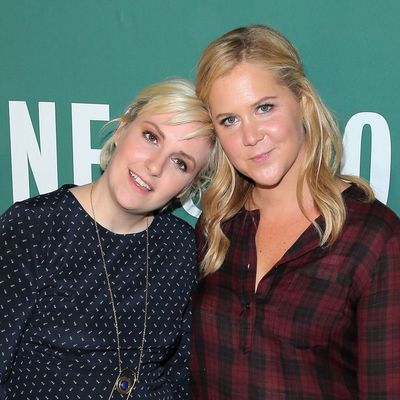
What the iPhone 6 release was for Apple obsessives and Chinese resellers, the kickoff to Lena Dunham’s book tour at Barnes & Noble in Union Square on Tuesday night was for NYU students. More than two hours before the event began, Isabel Jones, a junior in the Gallatin make-your-own-major program, stood in a line that stretched up Park Avenue. “I’m sort of studying becoming Lena Dunham,” she told me, a French textbook cracked open on her hip.
Inside, I was surrounded by three more NYU undergrads, two of whom lived in the same dorm but hadn’t even met yet. One had come to Barnes & Noble at 7 a.m. in order to buy Dunham’s memoir, Not That Kind of Girl, and secure a wristband for the event, and another had paid a guy 20 bucks to do it for her, a hassle that paid off during the Q&A session.
“This one is from Katie and Caroline, who claim to be our biggest fans, but this question is demented,” Dunham said. “Would you rather eat only mustard for the rest of your life or deep-fry your vagina?”
Katie and Caroline squealed, sinking in their seats.
But vagina queries felt like fair game, considering the occasion. Although Dunham is America’s youngest and most prolific exhibitionist, her memoir still manages to be impressively intimate. (There’s a chapter called “Who Moved My Uterus?”) And the book tour involves a “special partnership” with Planned Parenthood and other reproductive-rights groups, guest appearances from female comedians, and a Tumblr with information about reproductive rights and gender equality.
And many of the Dunham diehards who turned out already feel like they’re on vagina-talk terms with her. Some already have a Lena Dunham story — how friendly she was when they stumbled upon a Girls shoot, a friend whose co-worker is Dunham’s cousin and attended a family meeting after she first got famous to make sure no one treated her differently. For the rest, Dunham’s Twitter provides a sense of proximity.
Tess Cronin and Matt Pedretti took the first train into Manhattan after the last bell at Lakeland High School in Westchester County. In addition to loving Girls and Tiny Furniture, Cronin, a self-described “big social-media user,” said she loves Dunham “as a person and an activist.” “She’s a person who doesn’t really care what the media thinks of her,” she said. “A lot of people say that, but they still go through editors and press agents and such. I don’t know if it’s true or if it’s a mirage, but I feel like she doesn’t do it.”
A few days earlier, Dunham had revealed that she does, sometimes, care what the media thinks of her. After Gawker highlighted a New York Times report that speakers and guest stars on the Not That Kind of Girl tour were not being paid, Dunham corrected the situation quickly and good-naturedly. “The fact that Gawker pointed this out really proves Judd Apatow’s saying that ‘a good note can come from anywhere’,” she tweeted.
Dunham’s attempt to publicly grapple with her various privileges (her race, her upbringing, her connections) and disadvantages (her age, her gender, her subject matter), in search of a balance between autonomy and sensitivity, is not lost on her high-school fans.
“She’s not stubborn, but she knows what she believes in,” Pedretti said.
“She can hear other people’s perspectives without being wishy-washy,” Cronin added.
Everyone I spoke with Tuesday night shared a conviction that Lena Dunham had personally made life more bearable for her. Like Yirlany Perez, who wore a T-shirt printed with Dunham nudes, found through Dunham’s Instagram. “So many people say, ’What gives this woman the right to feel so comfortable in her own skin?’” said Perez, a clinic manager who lives in the Bronx. “The great thing about Lena is that by empowering herself, she empowers me.”
And empowerment is Dunham’s explicit goal with Not That Kind of Girl. Throughout the tour, she will host writing workshops with young women across the country. Dunham sees encouraging women’s writing as a political project, on par with her tour’s partnership with EMILY’s List, the fund-raising group for pro-choice female candidates. “Voting is a way to get empowered, and writing is a way to get empowered,” she explained. “So let’s vote and write our way to a better future.”
Still, with all the empowerment going on, Amy Schumer’s very un-empowering stand-up came as something of a relief. Like Dunham, Schumer is interested in female confidence. But where Dunham insists women can be imperfect and confident, Schumer reveals how sick and silly and sadly universal the inner monologue of the insecure woman is.
But Schumer joined Dunham in a similar earnest mode for the Q&A, and they presented a united front. Both women said they periodically fire the (male) editors in their heads. Both urged an 18-year-old with low self-esteem to fake it until it’s real, adding that their professional passions were a more reliable source of self-worth than relationships with men. And both counted their younger sisters among their most trusted and most important readers.
Dunham: My sister’s pretty good … she’s a little judge-y.
Schumer: I live in constant fear of my sister ceasing to love me.
Dunham: I know, I’m like, She’s just going to get sick of it one day — even though it’s her entire job not to.
Also on display was Dunham’s signature mix of precociousness and self-deprecation. She enlisted the crowd’s help on the pronunciation of hosiery and anonymity. She said she’d heard that mispronouncing words was a sign that a person started reading big words at a young age. “But really it just means you’re not listening to anybody.”




